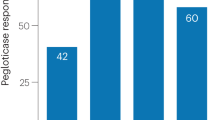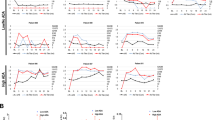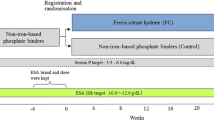Abstract
Standard prophylaxis and treatment of malignancy-associated hyperuricemia in the USA has been allopurinol with vigorous hydration, urinary alkalinization and osmotic diuresis. Urate oxidase, the enzyme that converts uric acid to allantoin (a readily excreted metabolite that has 5- to 10-fold higher solubility than uric acid), is an alternative therapy; however, few published findings support this practice. Between February 1994 and December 1996, we administered non-recombinant urate oxidase (Uricozyme) to 126 children with newly diagnosed non-B cell acute lymphoblastic leukemia (ALL) during the first 5 days of chemotherapy with methotrexate, 6-mercaptopurine or both. Their blood levels of uric acid and other indicators of tumor lysis were measured at diagnosis and during treatment and then compared with findings in 129 similarly treated historical controls who had received allopurinol to control hyperuricemia. Clinical responses to urate oxidase were also determined in eight patients with newly diagnosed B cell ALL or advanced-stage non-Hodgkin lymphoma. Patients treated with urate oxidase had rapid and significantly greater decreases in their blood uric acid levels than did the historical controls (median maximal level during treatment, 2.3 vs 3.9 mg/dl, P < 0.001). they also had lower creatinine (0.6 vs 0.7 mg/dl, P = 0.01) and blood urea nitrogen (11 vs 24 mg/dl, P < 0.001) levels. similar findings were made in the eight cases of b cell all or non-hodgkin lymphoma. none of the patients required dialysis for acute renal failure. six (4.5%) of the 134 children given urate oxidase had allergic reactions, manifested primarily by urticaria, bronchospasm and hypoxemia. thus, non-recombinant urate oxidase is a more effective uricolytic agent than allopurinol but is associated with acute hypersensitivity reactions, even in patients without a history of allergy.
This is a preview of subscription content, access via your institution
Access options
Subscribe to this journal
Receive 12 print issues and online access
$259.00 per year
only $21.58 per issue
Buy this article
- Purchase on Springer Link
- Instant access to full article PDF
Prices may be subject to local taxes which are calculated during checkout
Similar content being viewed by others
Author information
Authors and Affiliations
Rights and permissions
About this article
Cite this article
Pui, CH., Relling, M., Lascombes, F. et al. Urate oxidase in prevention and treatment of hyperuricemia associated with lymphoid malignancies. Leukemia 11, 1813–1816 (1997). https://doi.org/10.1038/sj.leu.2400850
Received:
Accepted:
Issue Date:
DOI: https://doi.org/10.1038/sj.leu.2400850
Keywords
This article is cited by
-
Safety and Effectiveness of Rasburicase in the Control of Hyperuricemia in Pediatric Patients with Non-Hodgkin’s Lymphoma and Acute Leukemia: An Open-Label, Single-Arm, Multi-center, Interventional Study
Drugs in R&D (2023)
-
Modeling and optimization of uricase production from a novel Pseudomonas mosselii using response surface methodology and artificial neural network
Biomass Conversion and Biorefinery (2023)
-
Synergistic Degradation of a Hyperuricemia-Causing Metabolite Using One-Pot Enzyme-Nanozyme Cascade Reactions
Scientific Reports (2017)



